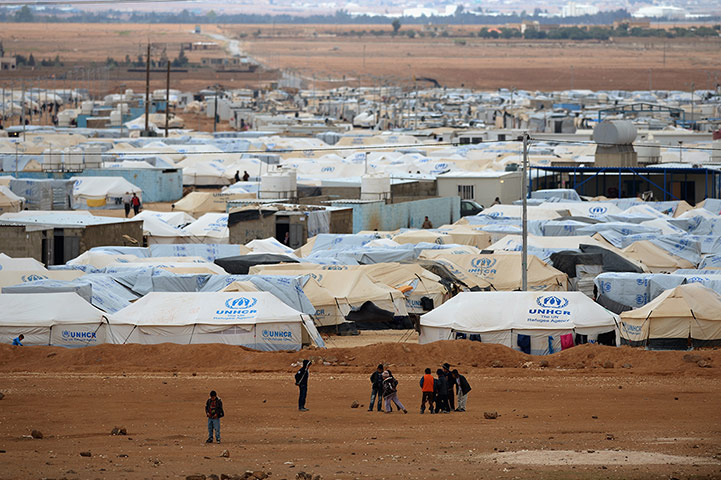Creating Normal
"The idea is to transform it slowly and gradually into a normal village ... to put in a system of street names, house numbers. I don't think the camp will be emptied any time soon.
"It's a very, very difficult camp -- the mentality of the people is difficult.
"They think that we are not doing enough for them. Maybe some of them have lost so much, they feel we should do better."
Iris Blom, administrator, United Nations High Commission for Refugees
Gratitude somehow gone astray, lost its way in the general melee of people desperately fleeing destruction, war, death, brought to them compliments of their government. Frustration with Syria's regime is there, palpable enough, since it is the reason why the country's majority Sunnis have fled in their hundreds of thousands to find refuge away from their towns that are being bombed, their fellow Syrians who are being strafed by artillery.
And resentment at the uncaring attitude by the world. Which hasn't responded to their plight in a manner that they would like to see done. The wealthy democratic countries of the world, held responsible for everything that goes wrong in the Muslim world. No particular resentment, it seems, at the countries surrounding Syria, Sunni-majority countries of the Gulf States, as example, whose wealth and rage at Syria's ruling Shi'ites hasn't been compelling enough to produce meaningful intervention.
So it is the world body, the United Nations, and other NGOs accustomed to providing succour to Arabs and Muslims when things get out of hand, as they so often do, that is engaged on behalf of the countries of the world, to give aid and assistance. And here is this particular safe haven Zaatari, a refugee camp in Jordan, where the head administrator in the camp is anxious to produce an atmosphere of normalcy.
The camp is so large that it represents the fifth-largest community within Jordan, and the world's second-biggest refugee camp. And it sits in an Arab country whose own stability is fraught with unease, a country unlike the Gulf States that has no brimming treasury. Over 1,000 Syrian refugees stream across the Syrian border into the Zaatari refugee camp daily; there is little other option for fearful Syrian Sunni civilians fleeing their government's vengeful wrath.
One refugee newly arrived from Daraa where the fledgling protest movement against the Alawite regime of President Bashar al-Assad began two years ago, described the tank shells and air strikes hitting civilian homes. Six of her cousins last week were stabbed to death by government troops, she says. "Buildings are destroyed, and you find people in the street killed or slaughtered. We sleep and as soon as we wake up we are in terror and fear."
In the sprawling refugee camp ramshackle shops crowd the 'main street' with meat markets, fruit stands, a launderette, restaurants. Most of the half-million refugees that have inundated Jordan find their way into towns, but about 110,000 have packed themselves into the camp's 5.3 dusty square kilometres. Oddly enough small numbers of refugees return to Syria every day even while countless others exit the country.
 |
Syrian refugees go
about their daily business in the Zaatari refugee camp in Mafraq,
Jordan, January 2013. Record numbers of refugees are fleeing the
violence in Syria to cross the border to northern Jordan, overwhelming
the camp. The Jordanian government and NGOs are appealing for help with
the influx of refugees
Photograph: Jeff J Mitchell/Getty Images
|
In the camp doctors have delivered 200 babies among the more than medical 200,000 cases, with 155 caesarean sections performed. The hospital at Zaatari is Moroccan-run. Prospects for the camp's facilities folding as the camp empties once a settlement is reached between the regime and the opposition are dim. Even if the regime does fall residents would remain in Zaatari for security reasons, or be replaced by Shia government supporters fearing reprisals.
In a sense, the camp already operates as a 'normal' place of residence in the Middle East. It has a persistent problem with crime and with intimidation and threats. Some of the refugees steal tents and even trailers, enterprisingly selling or renting them out though they are owned by the UN. Drug trafficking is widespread, as is vandalism of latrines, water taps and shared facilities. The vandalism culprits are mostly children; no one seems able to control them.
Canadian police are scheduled to arrive at the camp to aid in the training of Jordanian officers providing security, though some refugees claim Jordanian police demand costly bribes to permit refugees to leave the camp which they are supposed to be able to do freely. Other refugees complain the potable water trucked into the camp has given children diarrhea, that the bimonthly rations of rice, lentils, cracked what and canned tuna are insufficient.
The UN administrator confirms that refugees are not pleased about their accommodations, complaining about the cleanliness of facilities, the quality of food. Despite that she herself describes Zaatari as a "five-star" camp compared to others she has worked within.
The refugees speak of the regime's air strikes deliberately targeting bakeries when shoppers lined up to buy their bread. About strikes at the local mosque during prayers. "We want the international community to bomb Assad's palace and kill him", said one refugee bluntly, obviously expressing a bitterly popular desire to see the end of their misery.
But then, tribal and sectarian hatred and revenge are so deeply engrained by custom and culture in the Muslim Middle East.
Labels: Charity, Conflict, Culture, Human Relations, Islam, Syria, United Nations

<< Home